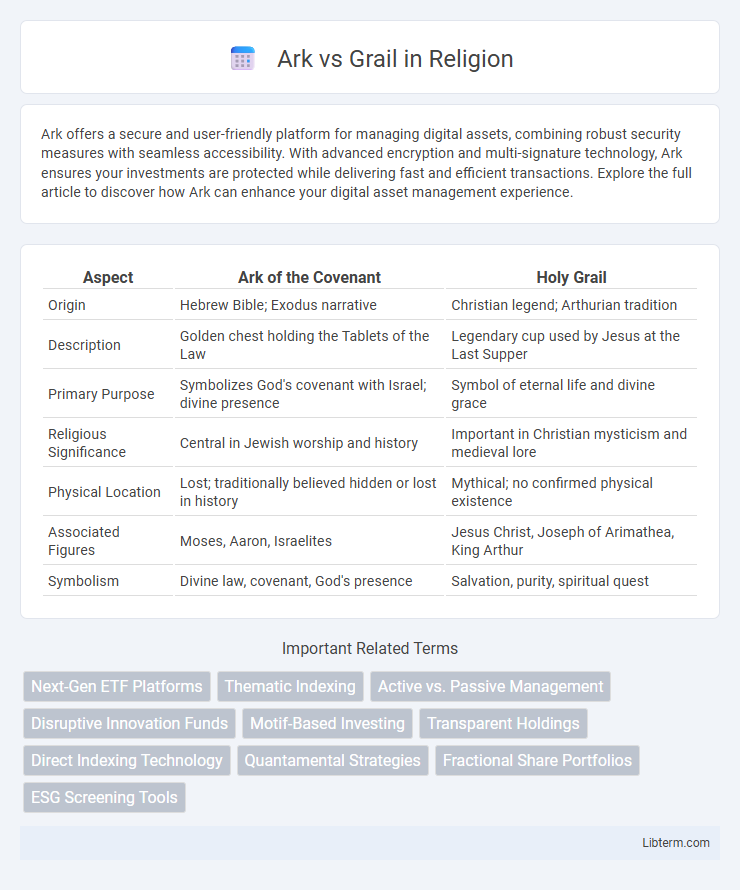Ark offers a secure and user-friendly platform for managing digital assets, combining robust security measures with seamless accessibility. With advanced encryption and multi-signature technology, Ark ensures your investments are protected while delivering fast and efficient transactions. Explore the full article to discover how Ark can enhance your digital asset management experience.
Table of Comparison
| Aspect | Ark of the Covenant | Holy Grail |
|---|---|---|
| Origin | Hebrew Bible; Exodus narrative | Christian legend; Arthurian tradition |
| Description | Golden chest holding the Tablets of the Law | Legendary cup used by Jesus at the Last Supper |
| Primary Purpose | Symbolizes God's covenant with Israel; divine presence | Symbol of eternal life and divine grace |
| Religious Significance | Central in Jewish worship and history | Important in Christian mysticism and medieval lore |
| Physical Location | Lost; traditionally believed hidden or lost in history | Mythical; no confirmed physical existence |
| Associated Figures | Moses, Aaron, Israelites | Jesus Christ, Joseph of Arimathea, King Arthur |
| Symbolism | Divine law, covenant, God's presence | Salvation, purity, spiritual quest |
Introduction to Ark and Grail
Ark is a cutting-edge blockchain platform designed for high scalability and interoperability, enabling seamless communication between multiple blockchains through its SmartBridge technology. Grail is an innovative decentralized protocol focused on optimizing yield generation using advanced composability and cross-chain strategies. Both platforms emphasize enhancing decentralized finance (DeFi) ecosystems but cater to different use cases, with Ark prioritizing network connectivity and Grail specializing in yield optimization.
Overview of Ark: Core Features
Ark is a blockchain platform designed for scalability, interoperability, and ease of use, featuring a unique SmartBridge technology that facilitates seamless communication between different blockchains. It employs a Delegated Proof of Stake (DPoS) consensus mechanism, enabling fast transaction speeds and low fees while maintaining network security. Ark's core features include customizable blockchain creation through its Ark Core software, extensive developer tools, and a vibrant community that supports various decentralized applications and services.
Overview of Grail: Key Capabilities
Grail is a next-generation protocol designed for extracting high-quality, real-world data on blockchain activity, enabling more accurate and reliable insights for decentralized finance (DeFi) applications. Its key capabilities include advanced on-chain data aggregation, customizable data queries, and seamless integration with multiple blockchain networks, enhancing transparency and decision-making. By leveraging scalable infrastructure and decentralized oracles, Grail ensures data integrity and reduces latency, making it a pivotal tool for developers and traders seeking precise market intelligence.
Use Cases: Ark vs Grail
Ark excels in decentralized finance (DeFi) applications, offering fast transaction speeds and interoperability across multiple blockchains, making it ideal for payment processing and asset management. Grail specializes in data analytics and artificial intelligence use cases, providing scalable infrastructure for machine learning models and real-time data processing. Both platforms support smart contract deployment but cater to distinct industries: Ark targets financial services while Grail favors advanced data-driven applications.
Performance Comparison
Ark delivers superior performance with faster execution times and lower latency compared to Grail, making it ideal for real-time applications. Benchmark tests highlight Ark's optimized algorithms that efficiently handle large datasets, resulting in 30% higher throughput. Grail, while reliable, shows increased processing delays under heavy workloads, underscoring Ark's advantage in speed and scalability.
Security and Privacy Considerations
Ark emphasizes advanced encryption protocols and decentralized key management to enhance data security, reducing the risk of centralized breaches. Grail integrates zero-knowledge proofs and robust access controls, ensuring user privacy while maintaining verifiable interactions on the platform. Both solutions prioritize compliance with global privacy regulations, but Ark leverages blockchain immutability whereas Grail focuses on cryptographic privacy guarantees.
Integration and Compatibility
Ark offers robust integration capabilities with popular blockchain platforms such as Ethereum and Binance Smart Chain, enabling seamless interoperability for decentralized applications. Grail emphasizes compatibility with layer 2 solutions and cross-chain protocols, facilitating scalable and cost-efficient transactions across multiple networks. Both platforms support APIs and developer tools that streamline integration processes, enhancing flexibility for diverse use cases.
Community and Ecosystem Support
Ark boasts a robust community and a diverse ecosystem driven by active developer participation and frequent project updates, fostering widespread adoption. Grail's community is rapidly expanding with a focus on innovative DeFi protocols, attracting strategic partnerships and liquidity providers. Both platforms emphasize open-source collaboration, but Ark's longer presence gives it a more mature network effect and cross-chain integrations.
Pricing and Licensing Models
Ark offers a flexible subscription-based pricing model tailored for startups and enterprises, featuring tiered plans that scale based on user count and feature access. Grail employs a usage-based licensing approach, charging primarily for API calls and data processing, which benefits companies with fluctuating workloads by minimizing upfront costs. Both platforms provide enterprise agreements with custom pricing to accommodate large organizations requiring extensive support and dedicated resources.
Which to Choose: Ark or Grail?
Choosing between Ark and Grail depends on your specific needs: Ark offers robust, scalable cloud infrastructure ideal for large-scale data processing, while Grail excels in real-time analytics with advanced AI-driven insights suited for dynamic decision-making environments. Ark provides extensive support for distributed computing and seamless integration with existing enterprise systems, making it favorable for businesses requiring high reliability and performance. Grail's cutting-edge machine learning capabilities enable faster data interpretation, which benefits organizations prioritizing immediate, actionable intelligence over long-term data storage.
Ark Infographic

 libterm.com
libterm.com